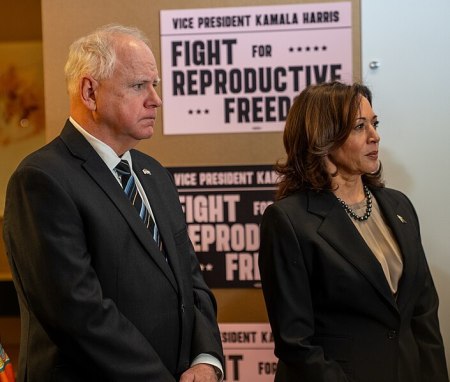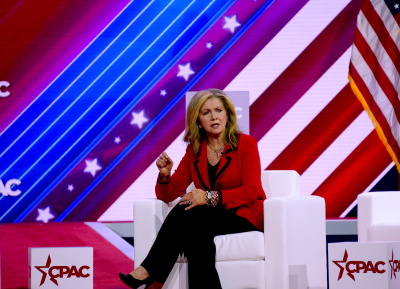Harris-Walz 'far leftism' will drive Christian turnout despite weakened GOP platform, conservative leaders say

Editors' note: This is part 12 of The Christian Post's year-long articles series "Politics in the Pews: Evangelical Christian engagement in elections from the Moral Majority to today." In this series, we look at issues pertaining to election integrity and new ways of getting out the vote, including churches participating in ballot collection. We'll also look at issues Evangelicals say matter most to them ahead of the presidential election, along with the political engagement of diverse groups, politically and ethnically. Read other articles in the series by clicking here.
Christians will be emboldened to vote in November because of the “far leftism” of the Democratic ticket despite a GOP platform that some believe has been softened on social issues important to Christian conservatives, political activists say.
The Republican Party garnered mixed reactions from social conservatives over its 2024 platform, which softens the party’s opposition to abortion and omits any mention of banning same-sex marriage.
Chad Connelly, founder of Faith Wins and the Republican National Committee’s first-ever national director of Faith Engagement, told The Christian Post that while many social conservatives might take issue with the softened platform, “I don’t know anybody in my orbit” who will “go out there and not vote for Trump.”
“GOP or pastor, even if they are upset about the platform and the way we were treated by the consultants, they’re going to vote for the most conservative candidate. I think there’s such a contrast now,” Connelly said.
Connelly contends that Harris and "her far-leftism,” as well as the selection of Democrat Minnesota Gov. Tim Walz as her running mate, “probably helps the Christian vote, honestly.”
“I mean, it looks like probably the most radical ticket ever nominated in all of American political history,” he continued. “A lot of our folks, pastors that we work with in Wisconsin and in the Minneapolis area who were very involved in trying to minister to some of the victims of rioting and some of the rioters, actually.”
“So, they saw what Walz did, and, of course, Kamala Harris was paying for the bail money for some of the people who were doing the destruction. I think all this nomination thing is going to help that.”
Connelly said Walz was “nobody’s moderate” and took issue with the governor’s recent comment that “one person’s socialism is another person’s neighborliness,” responding that “you can be biblically neighborly without forcibly taking money from people at the government’s behest.”
Timothy Head, executive director of the Faith & Freedom Coalition, an organization that spends millions each election mobilizing conservative Christian voters, told CP that he doesn't believe many conservative Christians will stay home on Election Day due to controversies surrounding the Republican Party's platform.
“I think, first of all, the contrast between what we now know to be the Democrat candidate, top of the ticket, and the Republican ticket is stark and clear,” said Head. “I don’t think that the platform unto itself is really top of mind for those average voters.”
Walker Wildmon, vice president of the American Family Association, believes that in spite of “the disappointing party platform changes, it remains true that the most pro-life candidates exist in the Republican Party.”
“To the contrary, the Democratic Party hardly has a pro-life candidate remaining,” Wildmon said. “Instead, the party as a whole has shifted to supporting abortion through all stages of pregnancy, and they can’t define what a woman is. The difference between the two parties is still quite stark.”

‘A betrayal of Christian voters’
Last month, ahead of the Republican National Convention in Milwaukee, Wisconsin, the Republican National Committee’s Platform Committee unveiled the 2024 platform.
Said to be heavily influenced by former President Donald Trump, the Republican presidential nominee, the platform was noted for being more scaled back compared to past election year platforms and took a softer stance on social issues, especially abortion.
“Unfortunately, this platform fell short in its steadfast support of the lives of the unborn,” said Chris Sadler, acting CEO of My Faith Votes, an organization that seeks to mobilize Christian voters, in comments to CP.
“My Faith Votes believes life begins at conception and it’s disappointing to see the Republican Party weaken on their defense of the unborn and betray the Christian voters that make up much of their base.”
Sadler also told CP that he considered the new platform “a betrayal of Christian voters” and evidence that the RNC “failed to listen to the activists and voices of the Republican Party and created a platform that betrayed their pro-life base.”
“The party platform doesn’t reflect laws or actions we pray that Republican and Democrat candidates will advocate for and work to protect life, beginning at conception,” he added.
Nicole Hunt, an issues analyst with Focus on the Family, said her organization was “disappointed to see the changes made to the GOP platform related to the sanctity of human life.”
"Indeed, we are dissatisfied with any political party platform that moves away from explicitly protecting preborn babies and their mothers from the tragedy of abortion,” Hunt told CP.
"Focus on the Family has always been unashamedly pro-life. It’s one of our foundational principles. Our commitment to fight for the lives of the preborn started when the organization was founded 47 years ago, in 1977, and it continues today.”
Not only was there much disappointment among conservative Christian groups, but also a sense among some that the process that led to the revisions for the GOP platform was not a fair one.
Connelly recounted to CP about how the first GOP convention he attended was in 2004, and he remembered there being “consultants who wished to water down the platform” even then.
“This time, the way they rolled the process, was very different,” he told CP. “I was actually elected by my own delegation, and consultants removed me because I was too pro-life and too conservative.”
“So, I wasn’t in the room, but once I found out they had done that in 20 some other states, I realized what was going on. They wanted to bake that cake before they got to the convention. I don’t think there was much discussion.”
Perkins also decried the platform revision process, telling CP “there was no discussion, no debate, no amendments,” and it was unprecedented.
“I have been a part of about five platform committees in the past, and it was very heavy-handed,” Perkins said. “Very disturbing what took place in a locked room when the media was not allowed in.”
Sadler said the revised platform “was forced upon platform committee members without the normal process of debate, discussion and committee decisions,” adding that he felt the GOP should have “a process driven by the people, the activists and the members of the party.”
Wildmon of AFA told CP that he felt the platform revision process “was not deliberative and considerate of the dozens of delegates who traveled in to debate the issues and find consensus on the platform.”
For his part, Head told CP that while he preferred the previous platform, he “felt like it was good to” acknowledge some pro-life views “and some other important issues for religious voters.”
“We do still believe that a federal approach would be great, but we’re certainly very comfortable with the state-by-state approach in line with the Dobbs decision at this point,” Head said, referencing the 2022 overturning of Roe v. Wade.
“I think a lot of significantly less, probably three or four, maybe even, platform processes have all been a little bit unusual. This one was different also, in that you have a former president who technically is not the sitting president but was the presumed nominee, etc. So I think there were some unusual dynamics through the process.”
Head told CP that “the process” did allow for “input,” with his group, the Faith & Freedom Coalition, having “input earlier in the process,” though “not at the platform committee itself.”
“We certainly felt heard and included in the process,” he continued. “I can’t speak to the other organizations, but at least we certainly felt like we were solicited and our input was integrated in.”
A diminished ‘intensity’?

Last month, conservative author and Newsmax host Todd Starnes posted to his X account reports that Republican Party leadership had dismissed the concerns that social conservatives had about the platform.
According to Starnes, one Evangelical Christian leader who addressed party officials was rebuffed and told, “Where else will your people go?”
When posed the same question by CP, Perkins of FRC said it was “not a matter of where we go,” but rather “a lot of people won’t go anywhere,” as the “intensity” of involvement might diminish.
“I’ve already gotten calls from people who do track this, who said, ‘Look, I can’t volunteer for the Republican Party anymore. I can’t volunteer for the Trump campaign,’” Perkins said, adding that this “doesn’t mean they’re not going to vote. I’m encouraging people to vote. I’m going to vote.”
“We believe it’s very important that we communicate we’re here for the policies, for the issues. As long as there’s a party that’s championing them, we’re with them. If they drop them or deprioritize them or move away from them, we’re not with you.”
Connelly told CP that he speaks with pastors on a weekly basis and noted that they were “upset, disappointed” and felt that the GOP was “trying to ride the fence” on the social issues.
“My dad said, ‘If you ride the fence, you’re going to get splinters where they really hurt,’” Connelly said. “And people are going to come at you from both sides.”
Connelly added that he knew “people who were so disappointed they didn’t come to the convention” and felt that while they will turn out to vote, “things like” the revised platform “works to depress people’s enthusiasm.”
Hunt was optimistic that “Christians will continue to engage in the political process because we know it's the only way to secure the freedoms and values we cherish.”
“The pro-life movement must continue to advocate for life within all political parties if we want to see the party platforms embrace a more life-affirming ethic,” she told CP.
The ‘longitudinal approach’
Regarding longer-term reactions, Perkins told CP that the FRC had changed its usual election year practice of comparing the Democrat and Republican platforms and instead have taken to contrasting the new GOP platform with its earlier incarnation.
According to Perkins, this platform comparison campaign includes a video that has been played in “thousands of churches” and has been “downloaded more than a million times” by individuals.
“Normally, we do a comparison between the Democratic and the Republican Party platforms, but we’ve done a comparison between the previous Republican platform and the current platform,” he explained. “A lot was left out. The life issue, obviously, of greatest concern, religious freedom internationally, the family, Israel, so a lot that was just left undefined.”

In addition to the campaign to show churches all the ways that the platform has changed, Perkins told CP that, in Tennessee, his organization was overseeing efforts to hold Republican Sen. Marsha Blackburn accountable for her involvement in the platform committee.
“We’re running ads in Tennessee asking people, voters in Tennessee, to call her and ask her why she was a part of this secretive effort to weaken the party’s stand on life, Israel, marriage,” Perkins noted.
“Most people don’t know what happened yet, and they don’t know how it happened. But as pro-lifers, as those who have come into this process because of their faith, we’re not going to drop these issues because one party says they’re no longer important.”
Other conservative Christian leaders were optimistic that the revisions done to the platform could be reversed in 2028, with Head telling CP that “we definitely take a long-term, longitudinal approach.”
“We suspect that it will remain a feature, a central feature in 2028 and beyond, because we’re particularly focused on federal and state legislation,” he added.
“I guess our emphasis is more on legislation than the platform itself. As long as the [Republican] Party is continuing to move forward in some form or fashion, we will be engaged and look forward to being a part of that evolution in the coming cycles.”
Wildmon of AFA told CP he was “hopeful that the 2028 Republican Party platform will reflect the party, including the millions of Evangelical Christians who consider themselves politically conservative and traditionally vote Republican.”
“Staying home and disengaging from society and government shouldn’t be a part of our playbook as Christians,” Wildmon declared. “We should seek to be salt and light and transform culture in every way possible and that includes during election season.”
Connelly told CP that he felt most people consider the problem to be “consultants” within the GOP “who just don’t share our biblical worldview,” but noted that “we’ll get another bite at that apple.”
“There’s no doubt about it. It’s not going to change anybody’s view. But I also don’t know anybody that wants to have a Kamala Harris administration, either,” he concluded.





















